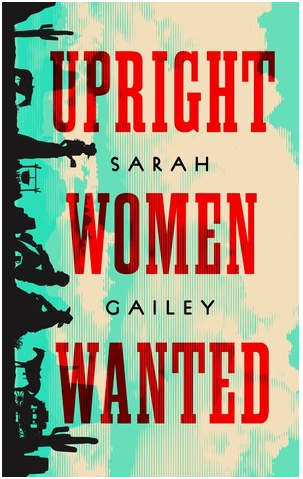 Gailey, Sarah. Upright Women Wanted. Tom Doherty Associates/Tor, 2020. 176 pages. $20.99. ISBN 9781250213587. (HC.)
Gailey, Sarah. Upright Women Wanted. Tom Doherty Associates/Tor, 2020. 176 pages. $20.99. ISBN 9781250213587. (HC.)
In a dystopian near future, the United States is in a state of perpetual war with three insurrectionist states in full rebellion, and the whole country divided into administrative regions, each with assigned functions.† Medical supplies, food, and consumer goods are in short supply because the government confiscates most to supply military forces. Settlements in the southwestern desert region where the book is set are run by sheriffs and strong men, with women relegated to† roles along strictly enforced traditional gender stereotypes.† One of the few jobs that allows women to travel without male supervision is that of† Librarian. Librarians are a small, select group of morally upright women who deliver state-approved books and pamphlets to the farmsteads, settlements, and towns hidden around the desert.
As the story opens, Esther has stowed away with a group of traveling Librarians to avoid being forcibly married to the ex-finace of her best friend and sometimeósecretó lover, Beatriz, after witnessing† Beatriz’ execution by hanging on the charges of deviance and possession of resistance propaganda.† Having led† a somewhat sheltered life as the daughter of the Superintendent of Lower Arizona, Esther finds that what she knows about womenís place in society is at odds with what she learns of the two Head Librariansí lesbian relationship and the existence of the nonbinary Assistant Librarian, Cye.† In the days that follow her escape, Esther comes to depend on herself and her companions, facing hard work, her growing attraction to Cye, sudden violence, and the threat of death.
Verdict: Although not much shorter than many Western novels, the book can be classified as a novella, more than a short story but less in than a novel . The story itself covers less than a week of horseback and wagon travel, with plenty of violent action and gunfire thrown in.† As Esther learns to fit in with the Librarians, she shows herself to be smart, capable and bold.
Sarah Gaileyís language is gritty and immediate, aptly describing the desert as well as showing the possible results of the current U.S. political trends of income inequality, misogyny, and homophobia.† Like The Handmaid’s Tale, white male supremacy seems very much the all-too-possible end result of the breakdown of civilization. I grieved when I read that Esther believed that there was no place in the world for girls who felt the way she and Beatriz had felt about each other. In the past, gay pride and gay liberation felt like celebratory markers of change; in the current political climate, they feel ephemeraló and Estherís world has crushed any vestiges of open celebration and pride.† As she observes the older lesbian and nonbinary Librarians, Esther learns that love and desire are not signs that she is evil or should die.† She discovers that the Librarians carry hope to others closeted and oppressed and decides to take that on as her lifeís work. As Estherís end-of-book revelation says,
Keep fighting. It will be hard, and it will be awful, and it will be worth it.† Donít give up, even when it feels like dying. Donít give up.† This is only the beginning.
May 2020 review by Jane Cothron, Lincoln County Library District.